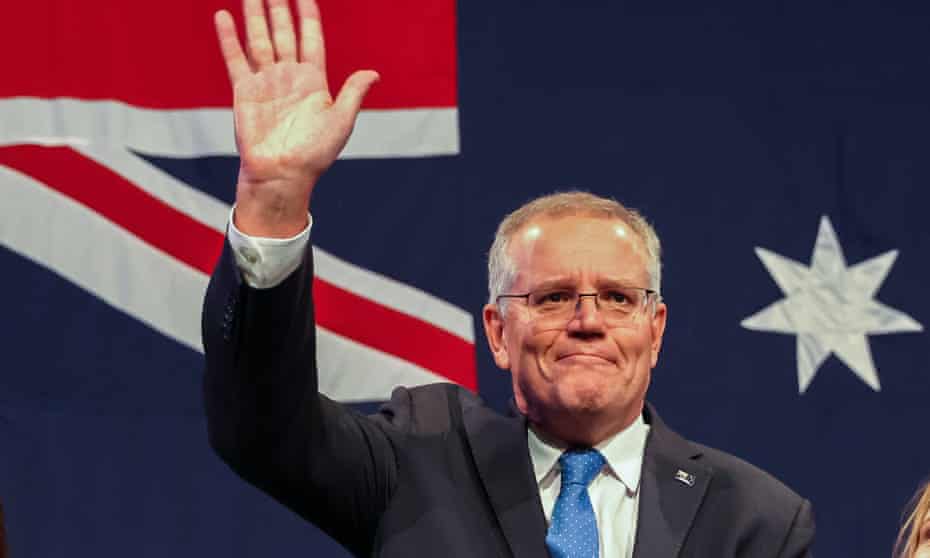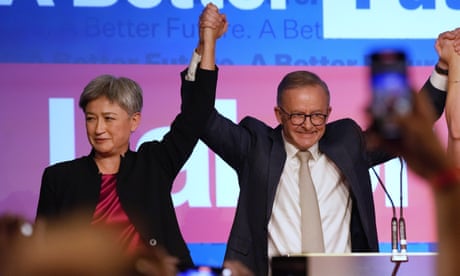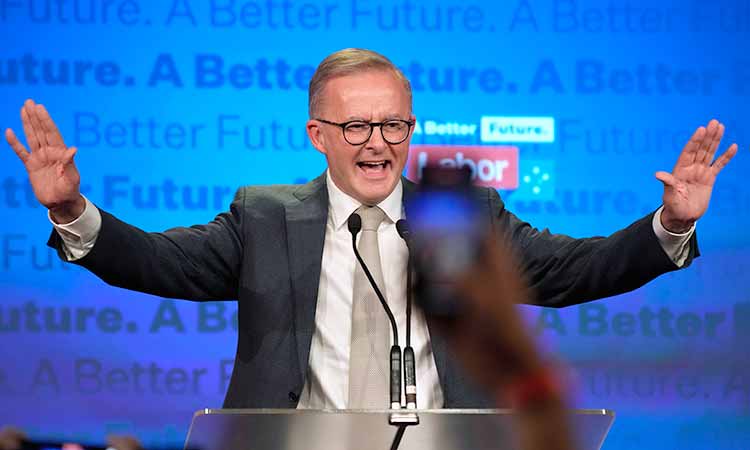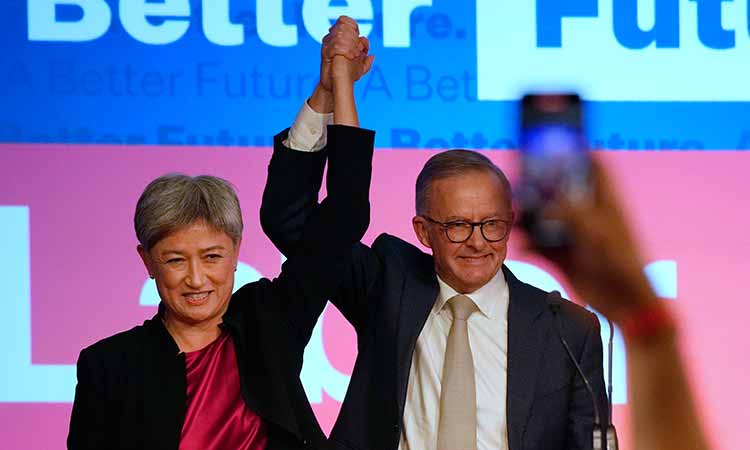Australia’s PM-elect announces climate policy change

Sydney, Australia, May 22 (EFE).- The leader of the Australian Labor Party, Anthony Albanese, who is set to take charge as the prime minister of the country, said that his new government would change several key policies, especially the country’s response to the climate crisis.
“There will be a change of policies on things like climate change,” especially regarding Australia’s commitment on the issue, Albanese told reporters in Sydney a day after his electoral victory, although it is not yet clear whether the Labor party would obtain a clear majority or need to form an alliance.
The party’s agenda includes reducing Australia’s polluting emissions by 43 percent, compared to 2005 levels, by 2030, a more ambitious target than the 26-28 percent goal set by the outgoing national coalition government, which was criticized both domestically and internationally for not taking more decisive measures against climate change.
Albanese and his foreign minister, Penny Wong, are set to be sworn-in on Monday in Canberra, before they attend Tuesday’s summit of the QUAD countries – Australia, the United States, India and Japan – in Tokyo.
On the next day, the leader would return to continue government formation efforts
So far, the Australian electoral commission has announced a Labor victory on 74 seats – close to the absolute majority of 76 – while the Liberal-National coalition led by the outgoing prime minister, Scott Morrison, has managed to secure 52 seats.
Morrison had admitted defeat on Saturday night.
According to the official provisional counting of votes, the Centre Alliance and the far-right Katter’s Australian Party have won one seat each, while the upcoming House of Representatives – with a total strength of 151 – will have 10 independent lawmakers who have backed strong measure against climate change.
The Australian Greens are expected to win between one to three seats in the elections, with the full results for the lower house yet to be announced. Election results for 40 of the senate’s 76 seats are also yet to be declared.
The electoral campaign had mainly revolved around economic issues and the high cost of living, with the country witnessing a 5.1 percent inflation rate – the highest in decades – along with foreign policy, gender equality and climate change, a subject which has caught greater attention after three years marked by multiple fires, droughts, floods and coral bleaching. EFE
wat/ia
Australia’s next prime minister came from humble beginnings
Australia's Labor to retake power after 9 years, independents may hold sway
Sunday, May 22, 2022
Australia's Labor Party will form the country's next government on Monday, as unprecedented support for the Greens and climate-focussed independents ended nearly a decade of rule by the conservative coalition.
Centre-left Labor remains four to five seats short of a majority of 76 in the 151 seat lower house with about a dozen electorates too close to call, television channels reported on Sunday. Labor may need the support of independents and smaller parties to return to power for the first time since 2013.
Labor leader Anthony Albanese said he will be sworn in as the 31st prime minister on Monday along with four senior party members, before heading to Tokyo to attend a "Quad" summit on Tuesday with U.S. President Joe Biden and the prime ministers of Japan and India.
"I do want to change the country. I want to change the way that politics operates in this country," Albanese told reporters after leaving a cafe in his Sydney suburb, where he was seen taking pictures with supporters.
Several world leaders, including British Prime Minister Boris Johnson and neighbouring New Zealand's Jacinda Ardern, congratulated Albanese on his win.
Prime Minister Scott Morrison's Liberal Party was toppled in several urban strongholds by independents, mostly women, who campaigned for more action on climate change, integrity and gender equality. The independents and a strong showing from the Greens also ate into Labor's vote share in many seats.
"I feel like now maybe is the time for us to do something different, and if we can get action on climate change, then that's going to be quite exciting," voter Mark Richardson in Sydney's Wentworth electorate told Reuters. Wentworth is among the traditional Liberal seats snatched by an independent this election.
Morrison, who will step down as leader of the Liberal party, was shown in TV footage at his church on Sunday morning.
You've given us a great foundation from which we could walk ... (in) what has been a very difficult walk ... over the last almost four years," a visibly emotional Morrison told fellow worshippers.
Official results could take several days, with the counting of a record 2.7 million postal votes to begin Sunday afternoon, two days earlier than prior elections.
If a hung parliament emerges, independents will hold considerable weight in framing the government's policies on climate change and the efforts to set up a national anti-corruption commission.
Deputy leader of Labor Richard Marles said the party could still get enough seats to govern on its own.
"I think there is a bit of counting to go, and we are hopeful that we can achieve a majority in our own right," Marles told ABC television.
Barnaby Joyce, the leader of the Liberals' junior partner, the National Party, said Australia needed a "strong government," which must be supported and also held to account.
"So you have to go from a good government to a good opposition," Joyce told Sky News on Sunday.
(Reuters)
Australia’s rightwing government weaponised climate change – now it has faced its reckoning
PM Scott Morrison has been dumped by electorate fed up with inaction on emissions and eager for change
Katharine Murphy
Sun 22 May 2022
When Scott Morrison won Australia’s federal election in 2019, it seemed like the country would never emerge from the climate wars that had begun a decade earlier.
Morrison had taken the prime ministership late in 2018 after conservatives in the ruling Liberal-National Coalition deposed Malcolm Turnbull, in part, for his attempt to reduce greenhouse gas emissions in Australia’s energy sector.
After taking the top job, Morrison went on to weaponise climate action , falsely branding a modest policy by the Labor opposition to impose new vehicle emissions standards as a “war on the weekend”. While electric vehicles are largely uncontroversial in Britain and other countries, Morrison’s stylised “war” was potent hyper-partisan politicking in a sprawling continent where electric vehicles are viewed through a prism of range anxiety.
Advertisement
When he won in 2019, Morrison, a Pentecostal Christian, characterised his victory as a “miracle”.

Australia’s government is changing after nine years of the Coalition – what happens next?
But the victory ultimately triggered a fundamental realignment in the Australian electorate. The harbinger of that realignment was Tony Abbott – the arch-conservative who once compared reducing carbon emissions to primitive people killing goats to appease the volcano gods – losing his blue-ribbon northern Sydney seat in the 2019 contest.
The Coalition had perfected a formula of weaponising climate action effectively in the regions and outer suburbs of Australia. But while Labor was routed in that territory, centre-right progressive voters in capital cities were becoming frustrated with Morrison and the Coalition’s failure to get serious about the existential problem of global heating.
Electoral pressure began to mount on moderate Liberals in Australia’s cities, and that pressure translated into a lobbying campaign by many government MPs to convince Morrison to adopt a target of net zero by 2050. Morrison was also under pressure from key allies including Boris Johnson and Joe Biden to make that mid-century commitment at the Glasgow climate conference in 2021.
Morrison signed up to the 2050 target, but the Liberal’s junior partner in the Coalition, the National party, refused to allow him to increase Australia’s medium-term emissions reduction target – a weak target that had attracted significant international criticism. In a half-pregnant pivot, Morrison also declined to produce credible policy mechanisms to deliver emissions reduction.
Morrison – a master of soundbite politics – had hoped to neutralise the growing city-based disaffection with slogans. The Coalition would make the transition to low emissions with technology, not taxes.
But his failure to repent for past reckless behaviour infuriated many voters. Those voters parted ways with Morrison’s government in Saturday’s election, voting for a swathe of climate-focused independents in Liberal held seats.
Understanding he was facing a “teal wave” (the new independents styled themselves in teal, adding a tinge of green to the Liberal party’s traditional blue), Morrison attempted to emulate an Australian version of Boris Johnson’s “red wall” strategy.
During this year’s contest, Morrison pursued Labor seats in the outer suburbs and regions, hoping gains would offset a loss of six seats. But the strategy backfired. The government lost the six seats, and several city electorates besides – and Labor will return to power in Australia for the first time in nearly a decade with a comprehensive electoral mandate to end the climate wars.
The National party held its seats, but suffered negative swings in coal country in Queensland, and failed to pick up a Labor-held coal seat in the New South Wales Hunter Valley that it had poured resources into; and after two climate-focused independents ran creditable campaigns in regional Australia, two safe National party seats have been rendered marginal.
The Coalition is shellshocked by the size and speed of Saturday’s electoral rout, and the Liberal party will enter a period of soul-searching as moderates and rightwingers jostle about what lessons the party should learn from the visceral rebuff. Should the Liberal party seek to represent urban professionals, or should that constituency be left to Labor, Greens and the teal disrupters?
As well as the backlash about climate action, Morrison also managed to alienate professional women with his inept handling of a cultural reckoning triggered by explosive allegations about the rape of a young Liberal staffer in the office of a junior defence minister in 2019.
While the Liberal and National parties engage in soul-searching, Labor is returning to government in Canberra. The new Labor government will be led by Anthony Albanese, an urban progressive from inner-city Sydney. Albanese will be in Tokyo by Tuesday for his first meeting with Biden, and the leaders of Japan and India.
The Labor leader is a parliamentary veteran. He was a senior minister in the last Labor government helmed by Kevin Rudd and Julia Gillard, and was chief parliamentary tactician during the 43rd parliament, where Gillard lacked a working majority in either the House of Representatives or the Senate.
He is a leftwinger who grew up with a single mother in council housing. He’s an inclusive figure, who values empathy in his leadership style, but wary of being typecast as a firebrand, he also speaks the language of aspiration and opportunity.
He comes to power in challenging times. Inflation and interest rates are rising, Australians are battling high petrol prices. Housing in the major cities has become unaffordable for a generation of young Australians.
Australians have voted overwhelmingly for change and Albanese comes to government with a progressive agenda. But in Australia, like the rest of the world – events define prime ministers as much as their policy wish-lists.
Analysis - In sharp switch, Australia votes for climate action
By Sonali Paul

MELBOURNE (Reuters) - Australia's election has brought in a wave of Greens and independents pushing for aggressive targets to cut carbon emissions, who will pressure the incoming Labor government to step up its climate plans if it wants to pass any legislation.
The country's biggest polluters in mining, oil and gas and building materials face a gradual tightening of allowed carbon emissions, while Labor aims to boost demand for electric vehicles and speed up renewable energy developments.
The election result, with the pivotal role climate change played, represents a remarkable shift for Australia, one of the world's biggest per capita carbon emitters and top coal and gas exporters. It was shunned at last year's Glasgow climate summit for failing to match other rich nations' ambitious targets.

"Together we can end the climate wars," incoming Prime Minister Anthony Albanese said in his victory speech. "Together we can take advantage of the opportunity for Australia to be a renewable energy superpower."
Albanese has said Labor would maintain its target of cutting carbon emissions 43% from 2005 levels by 2030, already much tougher than the outgoing conservative government's Paris target of a cut of up to 28%.
With votes still being counted, Labor is short of a majority in the lower house of parliament, so may need the support of an expanded cross-bench. Even with an outright majority, it could face a fight in the Senate, where it will likely to need to work with the Greens to pass legislation, including the 2030 emissions target.
"Now the battle will be over ambition in short-term targets, legislating a plan so it's out of the hands of any one government, and hitting pause on new fossil fuel mines," said Richie Merzian, climate and energy head at the Australia Institute think tank.
The Greens want to achieve net zero by 2035 rather than 2050, stop new coal and gas infrastructure being built, and end coal-fired generation by 2030.
Labor will also face pressure from a handful of climate-focussed independents pushing for emissions reductions of at least 50% by 2030.
FOSSIL FUEL JOBS
Defeated Prime Minister Scott Morrison once mocked Labor, brandishing a lump of coal in parliament saying, "Don't be afraid."
Since then, Labor - conscious of its defeat in 2019 when it lost seats in regions reliant on coal and gas jobs - has dropped or diluted policies that could hurt them.
Two days ahead of the election, a senior Labor politician heaped praise on the gas industry for building mega-projects that generate massive exports, forecast to reap A$70 billion ($50 billion) this year.
"I want to be clear how enthusiastic I am, but also how enthusiastic Labor is for this industry, because we know that it creates jobs and creates livelihoods," Labor's shadow minister for resources, Madeleine King, told a petroleum conference.
Labor's key climate policies are to boost demand for electric vehicles through tax breaks, provide A$20 billion in cheap finance to build transmission for new renewable energy projects and tighten the country's emissions "safeguard mechanism".
That mechanism sets a baseline of allowable emissions on the 215 big mining, energy and materials companies that emit more than 100,000 tonnes a year of carbon dioxide equivalent.
Companies are awaiting details on the plan, which envisions ratcheting down the baselines to get to net zero by 2050, but are largely unfazed by the proposal.
"At a big-picture level, it's probably not going to feel very different from commitments we've already made," Meg O'Neill, chief executive of gas producer Woodside Petroleum, told reporters this week.
Cost challenges could hamper Labor's push to achieve 82% renewable energy by 2030, with the rising cost of materials used in power lines, solar and wind farms. At the same time power prices are set to soar, mostly due to high global coal and gas prices.
"The next couple of years look awful for energy users, and whoever's in government will be under pressure over that," said Tennant Reed, climate and energy policy head at Australian Industry Group.
($1 = 1.4219 Australian dollars)
(Reporting by Sonali Paul; Editing by Lincoln Feast and William Mallard)
Kirsty Needham
Sun, May 22, 2022,


A scene at a polling station on Australian national election day in Sydney
By Kirsty Needham
SYDNEY (Reuters) - Professional women and voters concerned about climate change unleashed a third force in Australia's election, taking a swath of seats that ended nine years of conservative rule even as votes for the winning Labor Party fell.
Women who left successful careers in business, medicine and media to enter politics as independents were on track to win five seats from Prime Minister Scott Morrison's Liberal party in its affluent urban heartland in Saturday's general election, as moderate voters abandoned the government.
Independents or the minor Greens party looked set to win at least 15 of the 151 lower house seats, ABC election analysts said. Labor remained five seats short of the 76 seats it needs to form a government as counting continued on Sunday.
Personifying the disruptive change were centrists, mostly women, dubbed "teal" candidates because of teal-coloured marketing material used as they targeted seats held by Morrison's conservative party.
"You seldom see this in Australian politics - a campaign that springs up and catches fire," said Simon Jackman, a University of Sydney professor, referring to teal community campaigns run by women volunteers.
The election showed women's anger at Morrison and at inaction on climate change, underpinned by "a fierce desire to get accountability back into Australian politics", said Chris Wallace, a professor at the University of Canberra.
"There was a large overlap between women outraged by the government and voters overall who wanted action on climate policy," she told Reuters.
This "mobilised women in never before seen numbers – including the affluent, middle-class professional women who donned teal T-shirts and took several safe seats off the coalition," Wallace said.
Independent Sophie Scamps, a doctor who won a Sydney seat held by the Liberals for 70 years, told Sky News, "There were so many people in Mackellar saying, 'I have voted Liberal my entire life and they no longer represent me.'"
'AUSTRALIA HAS MOVED ON'
Monique Ryan, a paediatric neurologist who defeated Treasurer Josh Frydenberg in Melbourne, cited the gender pay gap and violence against women as key issues on Sunday.
Climate change struck the biggest chord with voters, said Jackman, who worked on polling data with Climate 200, a group funded by a former Liberal donor that gave money to around 20 independents.
Highly educated voters were also angry at the government on integrity issues, including the handling of gender and sexual assault claims in parliament that would not have been tolerated in most Australian workplaces, he said.
"Women were powerfully motivated," Jackman said, while their male partners were also coming to believe "that the Liberals are the past. Australia has moved on, we've moved on on climate, we've moved on on gender equality."
Former Liberal finance minister Simon Birmingham said the Morrison government should have embraced a more ambitious 2030 emission reduction target, and the election showed the Liberal Party needed to be more inclusive.
"Especially Australian women who are much more highly educated today," he told ABC television. "It's a cohort that we have clearly failed to have represented in sufficient numbers."
Jackman said businesswoman Allegra Spender, who won the Liberal Sydney seat of Wentworth as an independent, should have been Liberal party royalty. Her father was a Liberal lawmaker for a decade and her grandfather negotiated Australia's pillar ANZUS security treaty with the United States as foreign minister.
Instead, he said, Wentworth became a case study in how sophisticated moderate Liberal voters who understood climate science, and entrepreneurs who wanted to invest in greener technology had abandoned the party.
Greens appeared to have won two seats in the Queensland city of Brisbane that were badly hit by floods, and were leading in the flood-affected Brisbane electorate.
Greens leader Adam Bandt said Liberals and Labor both lost vote as a record number of people voted for the Greens. "This result is a mandate for action on climate and equality."
(Reporting by Kirsty Needham; Editing by William Mallard)
Sat, May 21, 2022,

Rugby great David Pocock is poised to become an Australian senator
Wallaby great and environmental activist David Pocock was poised to win a seat in the Australian Senate Sunday and become the first independent to hold the role for the national capital Canberra.
The former flanker, who earned 78 caps for Australia before retiring in 2019, is on the verge of unseating Liberal senator Zed Seselja, state broadcaster ABC reported, although votes continued to be counted.
The 34-year-old ran as an independent in the Australian Capital Territory (ACT), which includes Canberra, where he played for seven years with the Brumbies Super Rugby team.
"We've clearly shaken up politics in the ACT," he said in thanking his supporters.
The Zimbabwe-born Pocock stood on a campaign of more action on climate change, improving integrity of the political class, helping poorer Canberrans and standing up for women's rights.
Outspoken during his playing career on issues such as LGBTQ rights and climate change, he always rejected barbs from critics that athletes should stick to sports.
He was arrested in 2014 for chaining himself to a digger in a protest against a coal mine being opened in a forest in New South Wales.
Pocock announced his move into politics last December, saying he wanted to use his platform for positive change.
"Now, more than ever, we need political courage," he said then.
The Senate, parliament's upper house which reviews legislation put forward by lawmakers in the lower house, has 76 representatives, 12 from each of the country's six states and two from the its two territories.
Both ACT senators have always come from the ranks of the two major parties -- centre-left Labor and the conservative Liberals -- making Pocock's impact all the more impressive.
ABC said Labor's Katy Gallagher was set to retain the other seat in the ACT.
mp/arb/mtp



No comments:
Post a Comment